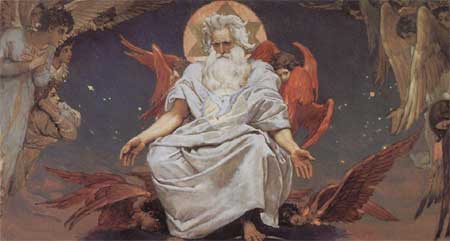
Before I can talk about arguments for and against the existence of God, I need to talk a bit about the nature of God. When we think about the nature of God, certain characteristics come to mind:
- God is Spiritual or Supernatural – most religions view ‘god’ as an entity or force that is beyond our physical selves. Of course, some religions aren’t limited to just one god – there are various gods, goddesses, and other spiritual entities. And in others like Buddhism, there is no concept of god.
- God is a Title – The word, ‘god,’ also usually refers to a title not a name. In Judaism, the name of God is YHWH. In other religions, god was named El, Baal, Zeus, Athena, Thoth, or Quetzalcoatl.
- God is to be Worshiped – The God or gods are usually the object of human devotion, prayer, and praise. As humans, we also want to worship something that deserves to be worshiped. The requirements for what deserves to be worshiped vary from religion to religion but all agree that if something does not deserve to be worshiped but is, it is a ‘false god’ or ‘idol.’
Looking at comparative religions for a moment, we can quickly see the numerous ways the god/entity/force is described.
- Dynamism – Dynamism describes all phenomena are made up of indivisible substances or forces. For instance, a particular object like a rock has certain powers. The concept was further elaborated on by Gottfried Wilhelm Leibniz with his explanation of monads.
- Animism – Animism is the belief that everything (including humans, animals, plants, and inanimate objects) is alive – or is possessed by a spirit or soul that (usually) survives after death.
- Pantheism – In this view, God, the universe, and everything in it are one and the same. Here, power is distributed throughout everything rather in particular objects or as spirits.
- Henotheism – In tribal culture, one tribe would swear allegiance to a particular god, though they recognized that there were other gods out there. For instance, while the Israelites worshiped YHWH, other tribes mentioned in the bible worshiped Dagon, Chemosh, El, or Baal.
- Dualism – This is the belief in two equal gods – one is usually designated as ‘good’ and the other ‘evil’ – who are engaged in an eternal struggle. Zoroastrianism is a prime example, with the good Ahura Mazda battling the evil Angra Mainyu (Ref 1)
- Deism – This is the belief that there is one Supreme Being out there but that Being does not intervene in this world. In the most popular flavor, God doesn’t intervene because the world is currently perfect and no intervention could make it more perfect. Others say that God created the world but now, for whatever reason, He/She/It doesn’t intervene or doesn’t care to intervene or can’t intervene.
- Theism – Theism is the belief that God (or the gods and goddesses) has human characteristics or likenesses. While there is always an Otherness quality to God, we also have something in common – like emotions.
- Polytheism – Here, there is a belief in many gods and goddesses who have dominion over certain specialties. Often, they bicker or fight amongst themselves. Greek and Roman mythologies are good examples.
- Monotheism – There is one God that deserves our worship and the worship of something else is seen as idolatry. This God knows all (omniscient) and can do all (omnipotent).
- Ethical Monotheism – Finally, in Ethical Monotheism, it’s not enough the one God knows all and can do all. God must also be the source for all things and be morally good and perfect. Examples include Judaism, Christianity, and Islam.
Of course, these aren’t the only ways of thinking about God. The counter philosophies to these types ways of looking at God include:
- Atheism– The belief that there is no God.
- Agnosticism – The belief that we don’t have sufficient evidence to confirm or deny the existence of God.
- Skepticism – Doubting that there is a God.
I’m going to be focusing on whether there is a God who is omniscient, omnipotent and morally perfect, as argued by the Ethical Monotheists. This is mainly because my background is in Judeo-Christian studies and I know more about these religious movements than I do about other religions. It’s also because much of my interest in the concepts of evil fit into Judeo-Christian theology. I’ve been fascinated by the concept of the Watchers, Satan, Lucifer and other fallen angel mythos that permeate these Western Traditions, so I prefer to focus on that before moving on to other religions.











 Philosophy of Religion: What is Religion?
Philosophy of Religion: What is Religion?